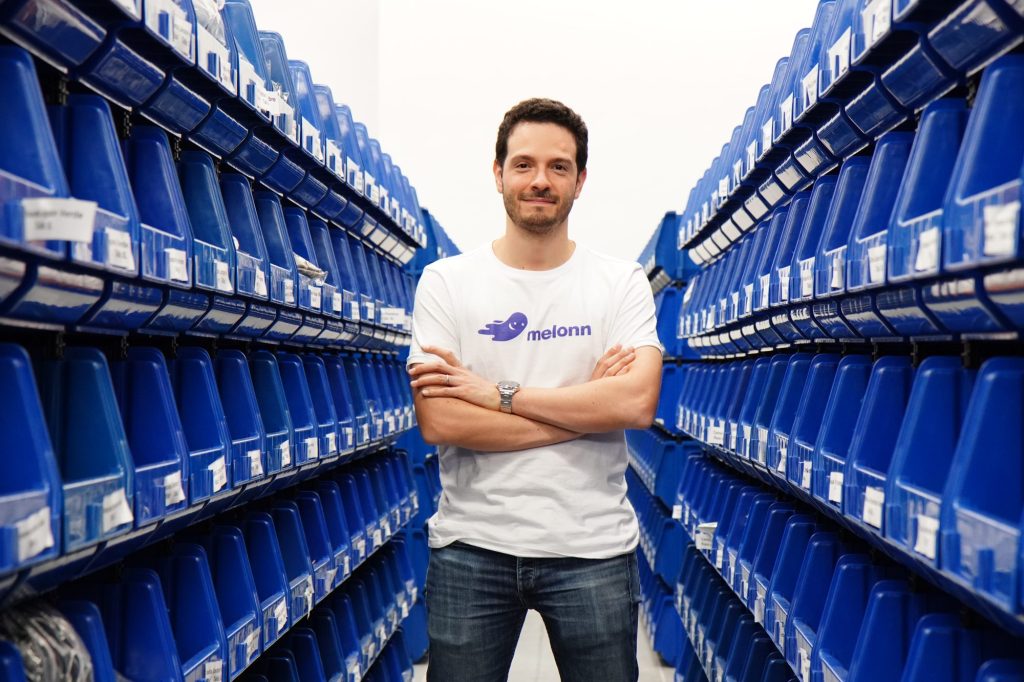Melonn, a Colombian startup that provides fulfillment and software services to small and medium-sized e-commerce companies in Latin America, has raised $20 million in a Series A round led by QED Investors.
The round comes less than a year after Melonn raised a pre-seed round from NFX. Interestingly, according to NFX General Partner Pete Flint, Melonn got its Series A pre-empted by QED “after getting competing offers from other top funds.”
NFX and existing backers Pear and Mexico-based Wollef (formely known as Jaguar Ventures) doubled down on their investment, which values Melonn “in the neighborhood” of $100 million post-money and brings the Bogota-based startup’s total raised to $24 million since its November 2020 inception. Other backers include Global Founders Capital and a number of high-profile angel investors, such as GGV Managing Partner Hans Tung, ALLVP Partner Antonia Rojas and LaHaus founders Jeronimo Uribe and Tomas Uribe, among others.
Melonn’s founders — CEO Andrés Gomez, CPO Alejandro Celis, COO Andrés Archila, CTO Felipe Jaramillo, director of data science Sebastián Román and Daniel Castrillón, director of software engineering & DevOps — have known each other since they were children or in high school and then took separate paths to work in different fields. They were brought back together by the pandemic to start the e-commerce enablement company.
Put simply, Melon is developing tech and fulfillment infrastructure — or the backend — to enable small and medium e-commerce merchants to “easily” sell and grow across multiple channels such as Shopify, Instagram and Amazon, and then deliver almost anywhere in the region.
The company has launched five distribution centers in three cities across Colombia and one more in Mexico City, with about 190 employees — including about 90 full-time employees and 100 contractors. Melonn is currently working with more than 300 brands and has fulfilled close to 500,000 items –– “well over” 100,000 of which were fulfilled in December. And in January, fulfillment is up 20% compared to November of 2021. Looking ahead, CEO Gomez projects that it will fulfill close to 6 million items in 2022. It also plans to soon offer embedded finance products. For context, the company’s model is similar to that of Deliverr and ShipBob.
Why global investors are flocking to back Latin American startups
So, just how does it work? Melonn says its proprietary tech platform guides sellers through “a simple and highly automated” onboarding process, then “seamlessly” connects their different e-commerce channels. Next, sellers ship their inventory to urban fulfillment centers, near their end-consumers. Melonn then takes care of the picking, packing and delivery, so that end-consumers receive their orders on the same or next day, also taking care of returns. Additionally, Melonn works with a range of transportation providers, including incumbents such as FedEx or DHL and last-mile startups, to reduce shipping times and costs.
The startup also gives sellers the ability to manage and monitor the process from its platform from wherever they are as well as access data analytics tools in an effort “to make better operational and sales and marketing decisions.”
CEO Gómez pointed out that Latin America has gone from being a laggard when it comes to e-commerce to being home to the world’s fastest-growing e-commerce market, which is estimated at over $100 billion and expected to double by 2025. It’s safe to say that over 80% of the market is made up of small and medium businesses and sellers.
“E-commerce is growing incredibly fast in the region,” he said. “And buyers’ expectations have also been growing at the same time. It’s a huge market and it’s hugely underserved.”
QED Investors Partner Mike Packer noted that the recent explosion of the market only reinforces the need for Melonn’s offering, which “makes scaling easier for its clients, solving very real constraints across channels and fulfillment.”
“QED is particularly attracted to Melonn because of the tech-forward approach in a world with many complexities across platforms,” Packer said. “The beauty of Melonn is the potential to both accelerate a business and integrate into platforms that its clients are already using.”
In his view, Melonn has a “fresh approach to disrupt e-commerce behind the scenes — everything from SaaS and financing to fulfillment enablement” with a tech platform and growing fulfillment network that “is superior to anything else on the market.”
The startup plans to use its new capital to grow its tech, product and sales teams as part of its effort to continue to strengthen the platform and develop adjacent products including embedded fintech. The company is also planning to scale up commercial capabilities and increase its network of urban fulfillment centers to be able to offer efficient same/next day fulfillment across more cities in the region.
A wave of LatAm fintechs are laying down new global commerce rails
Specifically, Melonn will expand in the regions in which it already operates and likely enter a third country in 2023 — potentially Brazil, where the opportunity is massive, said Gómez.
“We also just really want to build out the fulfillment network, and invest a lot on the commercial side, strengthening our sales and marketing teams and account management capabilities,” he added.
Interestingly, the name Melonn means “friend” in Elvish, the language spoken “The Lord of the Rings.”
“Some of my co-founders are big fans of The Lord of the Rings,” Gómez told TechCrunch. “And we realized it’s super aligned with what we want to do, which is be the number one ally of all these small e-commerce businesses so that they become successful, and can compete successfully in this market.”































Comment